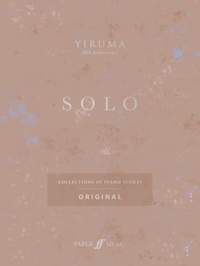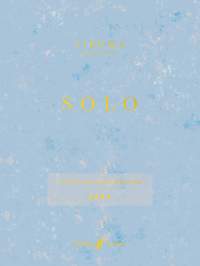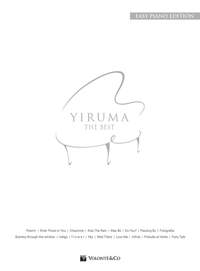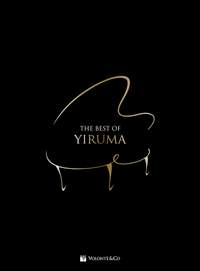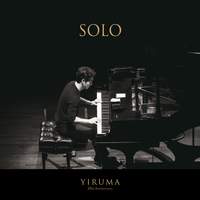Interview,
Yiruma: SOLO
Recently published by Faber Music, Yiruma's album SOLO is now available as a sheet music collection, in both original and simplified arrangements. The composer kindly took the time to answer our questions about his latest project and to discuss his background in classical music. You can read the full interview below.
Can you tell me the story behind SOLO: what inspired you with this project?
It was an album that compiled some of the early piano solo works I had released. This is one of two albums commemorating the 20th anniversary of my debut. Since these works were mainly written in my 20s and early 30s, they are honest expressions of the pure emotions I felt then.
What were your biggest inspirations and influences growing up?
Thanks to my parents, who loved music, I was introduced to the piano at five and dreamed of becoming a musician. Then, as a teenager, I gained a lot of experience while studying abroad at Purcell School in London. I believe the excellent education I received brought me closer to that dream. England, my family, my friends, and the scenery I captured inspired me the most.
When not composing or playing your own compositions, what piano music do you like to play?
I like playing classical music I learned in my old days. I must say it's not at a high level, and I only play it when I'm alone. Ravel, Chopin, and, of course, J.S. Bach. Occassionally Webern, Kurtag.
I believe you studied with Sir Harrison Birtwistle? What was that like?

It was my most incredible honor to meet Sir Harrison Birtwistle at King's College London. To name one episode, there was a time when students had to write music for the Lontano Ensemble, and the composition I wrote at the time was, of course, contemporary music. I’m sure one can imagine all those complicated time signature changes and rhythms, which made the conductor a bit of a struggle. So, the professor asked me to conduct it myself. I think he wanted to see if the composer fully understood the work that had been written, which could’ve been an examination to test out what I was capable of in a subtle way.
How much of an impact do you think the growth of the internet (with platforms such as YouTube) had on your career? How important do you feel these platforms are for future composers getting their work out to wider audiences?
People looking for music can now choose and listen to music according to their tastes. As the genres and music styles preferred by listeners become more precise, we seem to be seeing more concentration through the platform. I think I received the most effective help in making myself known in that regard. The most considerable appeal is that composers can present their music directly without anyone's help in the production and distribution. It's sometimes surprising that distribution is now possible with just a few clicks. As distribution has become more accessible, so much music has been released that it is sometimes difficult for my music to become known to the public. But if the music is good, it will be consumed somehow, whether it's Instagram or TikTok; sometimes, a phenomenon that spreads like a butterfly effect occurs due to one person's feed. In this way, you can experience your music becoming known worldwide.
Could you tell me about your compositional process? How do you begin to write your compositions?
I want to emphasize that this is purely MY feeling. Then, when you come up with a melody or chord that you like, play it over and over again. Usually, the recording is done simultaneously, so I can listen to it the next day, whether it sounds ok or not. As this work continues, the music gradually becomes more in shape. When I'm not writing music, I don't touch the piano for over a month. Just as being together daily gets boring, sometimes you must be apart to feel something new again.
‘SOLO’ is now available in sheet music format in the original arrangements, and arranged for easy piano; What led to your decision to create the two versions, and can you tell me a bit about the differences between them?
The difference between Easy and Original versions is in the key signatures and the number of notes. The Easy is a version that can be played with the most accessible keys possible, minimizes the number of keys that must be pressed at once, and simplifies the arpeggios, so it is a version that I would recommend to anyone who has just started playing the piano.
What piece of advice would you give to aspiring composers?
Believe in yourself. "I can write good music!." I repeat these words several times a day. And trust your ears. If it sounds good to you, it's good; if it sounds terrible to you, it's wrong. Don't listen to what others say. Just focus on the music you want to make. And lastly, don't compare yourself to others. Don’t forget that there is something special that can only be revealed in your music, so keep writing music. These may sound stereotypical, but it works.
What is next for you?
These days, I am constantly working on my instrumental music, but also pop music. I don't know when and how those songs will be released, but I want to let you hear them next year. And it's in a discussion about writing music for a drama series next year. I've been focusing on my works and songs, but I think it's time to do music for pictures. Starting with Oceania in November, a world tour is planned to Asia and Europe, including London, next year, so although it will be busy and challenging, I think 2024 will be a most productive year.
You can find both editions of SOLO and more Yiruma sheet music below
Yiruma SOLO: Original is the authorised collection from the best-selling album SOLO, written and scored by Yiruma for piano solo.
Available Format: Sheet Music
Yiruma SOLO: Easy is the authorised collection from the best-selling album SOLO, written and scored by Yiruma for easy piano solo.
Available Format: Sheet Music
More Sheet Music by Yiruma
Composed and selected by the composer himself, Yiruma The Best, features all the piano transcriptions within his bestselling album arranged for easy piano.
Available Format: Sheet Music
The first Yiruma collection, authorized for the European market, thanks to the exclusive partnership between Volontè & Co. and Mapia Music. All the piano transcriptions within the album, personally revised by Yiruma, are faithful to the original compositions.
Available Format: Sheet Music
Decca's recording of Yiruma's SOLO.
Available Formats: MP3, FLAC, Hi-Res FLAC





